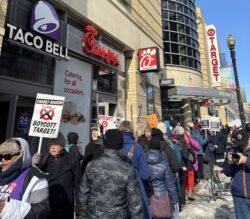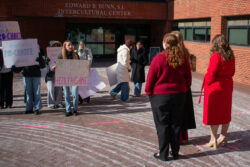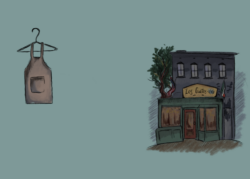From comedian to civil rights activist to ‘80s health guru, Dick Gregory won’t lower his voice for anyone. “I hate white folk,” Gregory announced at the beginning of his speech in Gaston Hall on Tuesday. “But not the white folk in this room,” he assured the audience before he launched into a speech about race relations in America. The Voice snagged a few minutes with Gregory after his speech, discussing everything from performing in Hugh Hefner’s Chicago Playboy Club to hunger-striking in Tehran during the 1979 Iran hostage crisis.
How did you get started in standup comedy?
It was an accident. I was in the army, just clowning around, and they threatened to put me in jail. I was just being a good soldier. And they said oh, unless you go down to the PX and entertain the soldiers. So I went down there. And then I won the best comic on the post, and the district, and [then] the whole army. But the best laugh you ever had in your whole life didn’t come from a comic, it came from your relatives and friends. So there’s a difference in being the life of a party and being a comic. I had to come back and learn timing.
You were hired by Hugh Hefner to work for the Chicago Playboy Club. What was that like?
Up until then, a black could not work a white night club. You could sing, you could dance, but you could not stand flat-footed and talk to white America. And Hefner was the one who made that happen. Without that, there wouldn’t have been a Bill Cosby or a Richard Brown. It also changed the whole complex of women comics and then just comics in general.
How do you feel about being included on Nixon’s Master List of Political Opponents, which also included Gregory Peck and Bill Cosby?
When they told me I was ranked number five on that list, I told them to go ahead and tell them I accept before he changed his mind.
So you were fairly proud of that standing?
Yes, it’s an honor.
Running for president as a third-party independent candidate in 1968, had you hoped to make a large dent in the vote?
No, I didn’t run for that reason. They say the greatest right you have in America is the right to vote, but I say that’s a lie. The greatest right is the right to register, and if they don’t give you anything to vote for, you don’t have to vote. And I just felt that voting for the lesser of two evils was a violation of God, so I decided that I wanted someone to vote for, so I was going to vote for myself. I felt there would be a lot of other people who didn’t want to vote for the lesser evil.
Why did you choose a hunger strike as your method of protest in Tehran during the 1979 Iran hostage crisis?
Well I’ve done hunger strikes before. But the reason is, in a country where more die from being overweight than underweight, I thought you should get people’s attention. Even if they didn’t like what the cause was, when they sit down and eat three meals a day, they think about this one person who wasn’t eating.
When was your first hunger strike?
The first hunger strike I went on was in 1967. I went 40 days protesting the war in Vietnam. My top weight was 365 pounds. When I got off the fast in 40 days, I was 92 pounds.
Would you consider that a healthy thing to do to your body?
When I was drinking a fifth of scotch a day every day and weighing 365 pounds and smoking a pack of cigarettes, nobody ever mentioned health.
Why did you choose to title your autobiography Nigger?
Well that word had been used secretly. It was ‘nigger this’ and ‘nigger that,’ so I said, “Here’s what I’m going to do. I’m going to take this nigger snake and defang it. I’m going to take it out of the closet.” I lost millions of dollars because people were scared and ashamed, so they’d walk into a bookstore and say, “Give me one of those Gregory whatcha-ma-callits.” But that’s what it was, until we talked about it.
How do you feel about the current state of civil rights in America today and have we made any progress since the 1960s?
Never before in the history of this planet has anybody made the progress that African-Americans made in spite of white folks and black folks lying about them. Here’s the problem. You and I work in a steel mill. We’re dirty, we go to a coal mine, and then we come back and go to this party so we go home and we put clean clothes on but we don’t wash up our body. We’ve got clean clothes on but we don’t wash our body—that’s America. We’re not aware. That’s what’s scary. And then you hear this stuff—do you know how many people would be shocked to find that a white teenager in rural America is 83 times more likely to use crack than a black in a large urban area? If you look at the new stats that came out on OD deaths and they break them down, they’re led by white women, white teenagers, and white Southerners. That’s the problem.
—Interview by Alison Crowley




